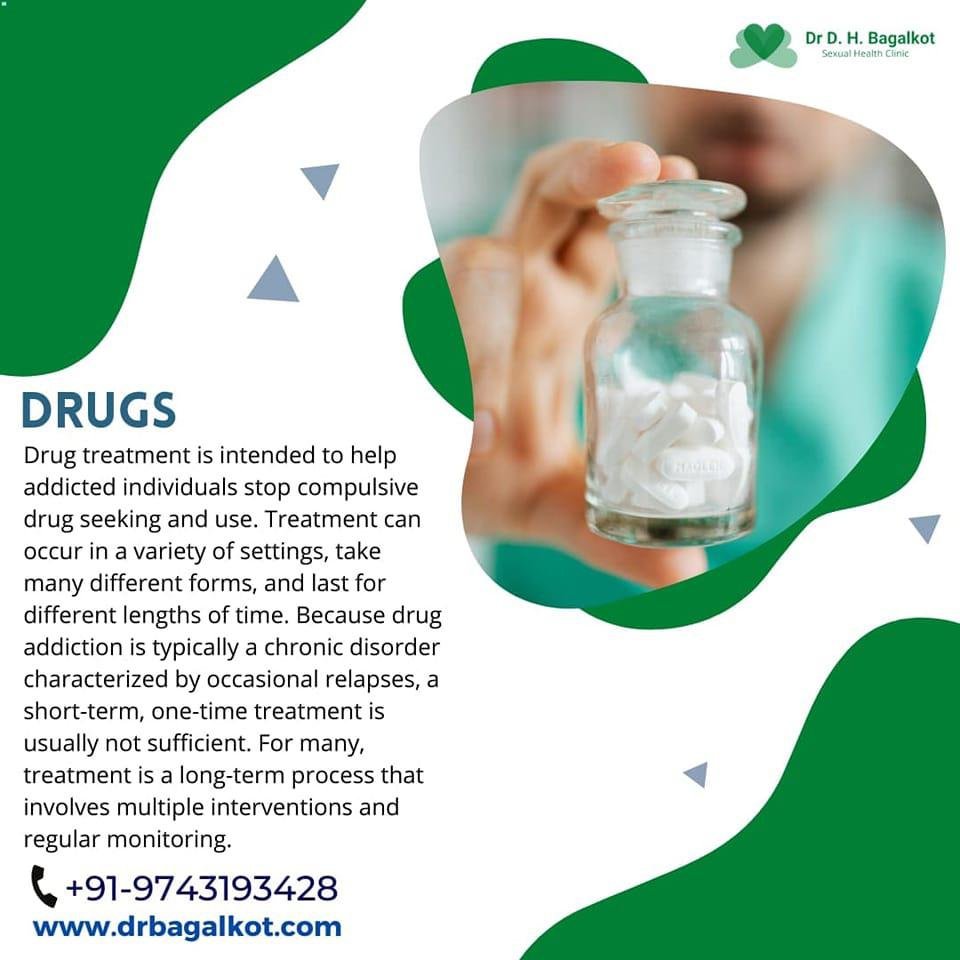Drugs

Drug addiction is a complex and challenging condition that can have profound negative effects on physical and mental health, relationships, and overall well-being. Overcoming drug addiction is a courageous journey that requires dedication and support. Here are steps to help you or someone you care about de-addict from drugs:
1. Acknowledge the Problem: The first and most crucial step in de-addiction is recognizing that drug use has become a problem in your life. This self-awareness is essential to motivate change.
2. Seek Professional Help: Consulting a healthcare professional or addiction specialist is vital. They can assess the severity of the addiction, recommend appropriate treatment options, and provide guidance throughout the recovery process.
3. Detoxification (Detox): For individuals with severe drug addiction, a medically supervised detoxification program may be necessary. This process helps safely manage withdrawal symptoms, which can be uncomfortable and even life-threatening in some cases.
Understanding Drug Addiction:
- Physical Health Issues: Drug abuse can result in a range of health problems, including overdose, infectious diseases (e.g., HIV/AIDS, hepatitis), heart disease, respiratory issues, and more.
- Mental Health Challenges: Substance abuse often co-occurs with mental health disorders such as depression, anxiety, and bipolar disorder.
Drug addiction, also known as substance use disorder, is characterized by the compulsive use of drugs despite harmful consequences. It is a chronic disease that affects both physical and mental health and can lead to severe medical, social, and legal problems.

De-Addiction from Drugs: A Path to Recovery and Renewal
Drug addiction is a complex and challenging condition that affects millions of individuals worldwide. Overcoming drug addiction is a transformative journey that requires commitment, support, and a comprehensive approach to recovery. In this article, we will explore the process of de-addiction from drugs and provide guidance for those seeking a drug-free life.
Legal Consequences: Engaging in illegal drug use can lead to criminal charges and legal consequences.
Acknowledgment: The first step is recognizing the addiction and acknowledging the need for help. This often involves seeking support from loved ones, friends, or professionals.
Detoxification (Detox): Under medical supervision, individuals may undergo detox to safely manage withdrawal symptoms. This process helps rid the body of drugs and stabilize physical health.
Rehabilitation: Rehabilitation programs, which can be inpatient or outpatient, focus on addressing the psychological and behavioral aspects of addiction. These programs often include therapy, counseling, and group support.
Lifestyle Changes: Adopting a healthier lifestyle with regular exercise, proper nutrition, and stress management is crucial for long-term recovery.
Relapse Prevention: Developing relapse prevention strategies and skills to cope with triggers and cravings is an integral part of recovery.
De-addiction from drugs is a challenging but achievable goal that leads to improved health and well-being. Quitting drugs requires determination, support, and a multi-faceted approach. By taking one step at a time, seeking support from loved ones or professionals, and staying committed to a drug-free life, individuals can break free from the grip of addiction and enjoy the many benefits of a substance-free lifestyle, including improved physical and mental health, stronger relationships, and a brighter future.
